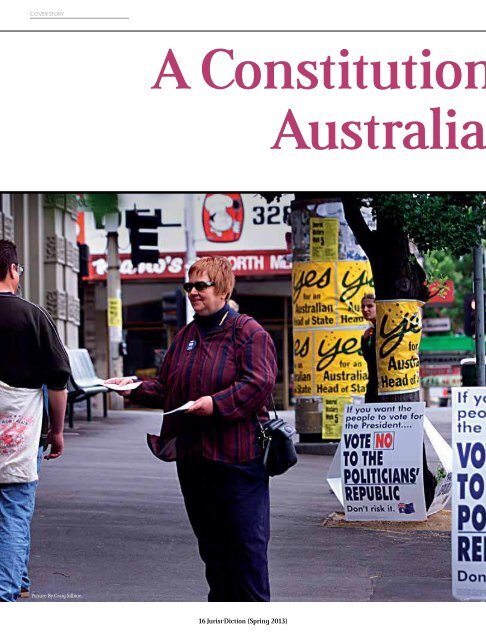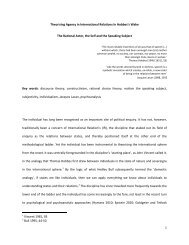PeoPLe, PoLicieS And PLebiSciteS: reforming the conStitution
PeoPLe, PoLicieS And PLebiSciteS: reforming the conStitution
PeoPLe, PoLicieS And PLebiSciteS: reforming the conStitution
You also want an ePaper? Increase the reach of your titles
YUMPU automatically turns print PDFs into web optimized ePapers that Google loves.
COVER STORY<br />
COVER STORY<br />
A Constitutional Recipe for an<br />
Australian Republic<br />
Helen Irving<br />
One fine day, an Australian republic may be back<br />
on <strong>the</strong> national agenda. If a republic is ever to be<br />
achieved, a referendum to amend <strong>the</strong> Constitution<br />
will be needed. Success will be difficult.<br />
Picture By Craig Sillitoe.<br />
Most referendums in Australia’s<br />
constitutional history have failed. We<br />
don’t really know why, but we have<br />
some reasonable intuitions. Proposals that are<br />
radical — or able to be depicted as such — have a<br />
lower chance of success than proposals that reflect<br />
<strong>the</strong> status quo or <strong>the</strong> comfortable aspirations<br />
of <strong>the</strong> majority. Referendums that incorporate<br />
multiple changes in a single question are less<br />
likely to succeed than those with few. Proposals<br />
that attract any level of organised opposition<br />
are as good as certain to fail. The 1999 republic<br />
referendum suffered from all <strong>the</strong>se drawbacks. Its<br />
resounding defeat suggests that ano<strong>the</strong>r attempt<br />
should only be made when <strong>the</strong>re is unmistakeable<br />
evidence of support.<br />
Some republicans see a referendum as <strong>the</strong><br />
opportunity for major constitutional change. In<br />
1999, <strong>the</strong> ‘maximalists’ included advocates of <strong>the</strong><br />
direct election of <strong>the</strong> head of state, and those who<br />
wanted a bill of rights in <strong>the</strong> Constitution. To be<br />
blunt, nei<strong>the</strong>r has much chance of success.<br />
Although, in 1999, direct election was popular<br />
with many Australians, many o<strong>the</strong>rs, including<br />
political leaders, were implacably opposed. A<br />
powerful ‘No’ alliance would be certain to form were<br />
direct election included in a referendum question.<br />
However popular <strong>the</strong> idea might appear, <strong>the</strong> record<br />
would indicate almost certain defeat. (Seemingly<br />
popular proposals have failed in <strong>the</strong> past.)<br />
The more recent experience of <strong>the</strong> National<br />
Human Rights Consultation’s proposal that<br />
Australia should adopt a non-constitutional<br />
Human Rights Act is indicative of <strong>the</strong> likely<br />
outcome if a bill of rights were included. In 2010,<br />
a concerted oppositional campaign by, among<br />
o<strong>the</strong>rs, religious and political leaders, led to<br />
<strong>the</strong> proposal’s abandonment by government. A<br />
constitutional proposal would unquestionably<br />
attract even fiercer opposition.<br />
Everything we know about referendum history<br />
and Australian attitudes suggests that minimal<br />
changes should be sought. Those who want a<br />
republic have to be realistic. For success to be<br />
conceivable, <strong>the</strong> proposal should leave as much<br />
of <strong>the</strong> Constitution untouched as possible. This is<br />
less defeatist than it sounds; current constitutional<br />
practices are, in fact, already well on <strong>the</strong> way<br />
towards a republic.<br />
The 1999 referendum proposed replacing<br />
<strong>the</strong> Constitution’s references to <strong>the</strong> Governor-<br />
General with references to a ‘President’, to<br />
be appointed by a two-thirds majority of <strong>the</strong><br />
Commonwealth Parliament, with <strong>the</strong> nominee<br />
chosen by <strong>the</strong> Prime Minister in agreement with<br />
<strong>the</strong> leader of <strong>the</strong> Opposition. As a concession<br />
to <strong>the</strong> widespread wish for popular choice,<br />
<strong>the</strong> Prime Minister’s list of candidates was<br />
to be provided by a broadly representative<br />
nomination committee, appointed by <strong>the</strong><br />
Parliament.<br />
This proposal didn’t satisfy ei<strong>the</strong>r side.<br />
The plan was to be minimalist, but <strong>the</strong><br />
proposed changes were complicated and<br />
unnecessarily large in number. First, <strong>the</strong> title<br />
‘President’ was a mistake. ‘President’, for<br />
some, invoked an American-style executive,<br />
unnecessarily suggesting radical change.<br />
Fur<strong>the</strong>r, <strong>the</strong> substitution of ‘President’ for<br />
‘Governor-General’ would have required<br />
16 Jurist·Diction {Spring 2013} Jurist·Diction {Spring 2013} 17
















